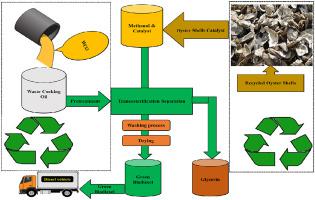Sustainable Chemistry and Pharmacy ( IF 6 ) Pub Date : 2020-08-21 , DOI: 10.1016/j.scp.2020.100310 Yuan-Chung Lin , Kassian T.T. Amesho , Chin-En Chen , Pei-Cheng Cheng , Feng-Chih Chou

|
In this study, biodiesel synthesis from waste cooking oil (WCO) using waste oyster shells derived catalyst (CaO-based catalyst) as a sustainable based heterogeneous catalyst under a microwave heating system technology was investigated. The CaO-based catalysts were characterized by Fourier Transform-Infrared (FTIR), X-ray diffraction (XRD), Electronic Data System (EDS) and Brunauer-Emmett-Teller (BET) measurements. Under optimized conditions, this study has produced tentative results with considerable performances in relations to biodiesel synthesis as follows: (1) the intensification in relation to reaction time from 120 to 180 min has significantly increases the biodiesel yield, which declines with a more intensification to 120 min; (2) the synthesis of biodiesel in this study has proved to increase with an upsurge reaction of power; (3) whereas 180 min reaction time with 800 W microwave power, a methanol-to-oil molar ration of 9:1, a reaction temperature of 65 °C; and 6 wt% catalyst concentration was revealed to be optimal and perfect reaction conditions for this present research work. The highest biodiesel yield was recorded at 87.3% in this study. Whereas the activation energy (Ea) for the catalyzed transesterification reaction was found to be 9.56 kJ/mol. In a nutshell, waste oyster shells were recycled as a sustainable base heterogeneous catalyst to synthesize new biodiesel from WCO, which can be used in diesel engines to address air pollution, especially pollutant emissions from diesel automobiles.
中文翻译:

在微波加热系统下,使用回收的牡蛎壳作为可持续的基础非均相催化剂,从废食用油中合成绿色生物柴油的更清洁工艺
在这项研究中,研究了在微波加热系统技术下,利用废牡蛎壳衍生催化剂(CaO基催化剂)作为可持续的非均相催化剂,从废食用油(WCO)中合成生物柴油。基于CaO的催化剂通过傅立叶变换红外(FTIR),X射线衍射(XRD),电子数据系统(EDS)和Brunauer-Emmett-Teller(BET)测量来表征。在最佳条件下,这项研究产生了与生物柴油合成相关的初步结果,其性能表现如下:(1)与反应时间120至180分钟有关的强化显着提高了生物柴油的产率,而随着强化程度的增加,生物柴油的产率下降。 120分钟; (2)这项研究证明生物柴油的合成随着功率的高潮反应而增加;(3)在800W微波功率下反应时间为180分钟,甲醇与油的摩尔比为9:1,反应温度为65℃;对于本研究工作而言,催化剂浓度为6%(重量)是最佳和理想的反应条件。在这项研究中,最高的生物柴油产率为87.3%。而活化能(催化的酯交换反应的E a)为9.56 kJ / mol。简而言之,废牡蛎壳被回收利用作为可持续的基础非均相催化剂,从WCO合成新的生物柴油,该柴油可用于柴油发动机以解决空气污染,特别是柴油汽车的污染物排放。



























 京公网安备 11010802027423号
京公网安备 11010802027423号